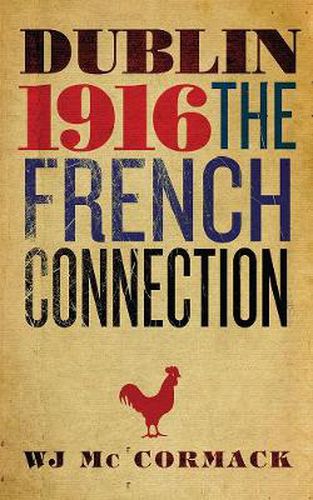Readings Newsletter
Become a Readings Member to make your shopping experience even easier.
Sign in or sign up for free!
You’re not far away from qualifying for FREE standard shipping within Australia
You’ve qualified for FREE standard shipping within Australia
The cart is loading…






This is a strikingly original work. All revolutionary movements since 1789 have looked instinctively to the French model. In this book, Bill Mc Cormack demonstrates that the French influence in Ireland was indeed profound, especially in the years leading up to the Easter Rising. However, it was not the traditions of the Tennis Court Oath or Bastille Day that motivated the Irish rebels, but a new French Catholic nationalism which reached its apogee with the Dreyfus Affair (1895) and which pervaded literature as well as politics.
This was a complex reactionary movement, partly religiose, partly royalist, and anti-modern. In Ireland, its influence was advanced through the thought of individual visitors, through Catholic teaching orders, and through a vigorous periodical press. The ‘blood sacrifice’ rhetoric of Patrick Pearse and (eventually) James Connolly owes more to Maurice Barres than to Wolfe Tone. Connolly’s use of the sympathetic strike derives from Georges Sorel’s syndicalism.
Mc Cormack examines how the formerly anti-clerical Irish Republican Brotherhood was in effect re-baptised by a French-inspired Catholic mission, which even absorbed Pearse’s English and agnostic father. He explores the wealth of French material published by Thomas MacDonagh and J. M. Plunkett in The Irish Review (1911-1914), and traces the long campaign of The Catholic Bulletin to convert the rebel dead into martyrs. Finally, he discusses how the anti-democratic undertow of 1916 breaks out again in 1939 with the IRA’s bombing campaign in England.
$9.00 standard shipping within Australia
FREE standard shipping within Australia for orders over $100.00
Express & International shipping calculated at checkout
Stock availability can be subject to change without notice. We recommend calling the shop or contacting our online team to check availability of low stock items. Please see our Shopping Online page for more details.
This is a strikingly original work. All revolutionary movements since 1789 have looked instinctively to the French model. In this book, Bill Mc Cormack demonstrates that the French influence in Ireland was indeed profound, especially in the years leading up to the Easter Rising. However, it was not the traditions of the Tennis Court Oath or Bastille Day that motivated the Irish rebels, but a new French Catholic nationalism which reached its apogee with the Dreyfus Affair (1895) and which pervaded literature as well as politics.
This was a complex reactionary movement, partly religiose, partly royalist, and anti-modern. In Ireland, its influence was advanced through the thought of individual visitors, through Catholic teaching orders, and through a vigorous periodical press. The ‘blood sacrifice’ rhetoric of Patrick Pearse and (eventually) James Connolly owes more to Maurice Barres than to Wolfe Tone. Connolly’s use of the sympathetic strike derives from Georges Sorel’s syndicalism.
Mc Cormack examines how the formerly anti-clerical Irish Republican Brotherhood was in effect re-baptised by a French-inspired Catholic mission, which even absorbed Pearse’s English and agnostic father. He explores the wealth of French material published by Thomas MacDonagh and J. M. Plunkett in The Irish Review (1911-1914), and traces the long campaign of The Catholic Bulletin to convert the rebel dead into martyrs. Finally, he discusses how the anti-democratic undertow of 1916 breaks out again in 1939 with the IRA’s bombing campaign in England.